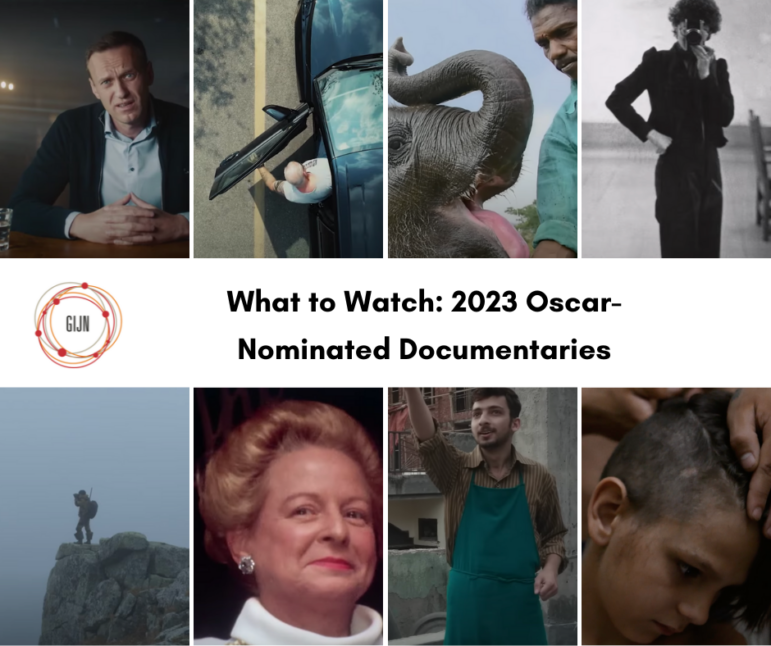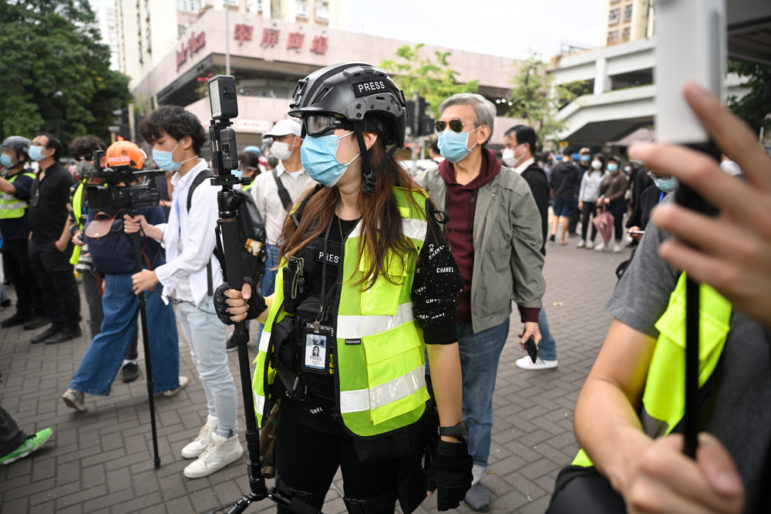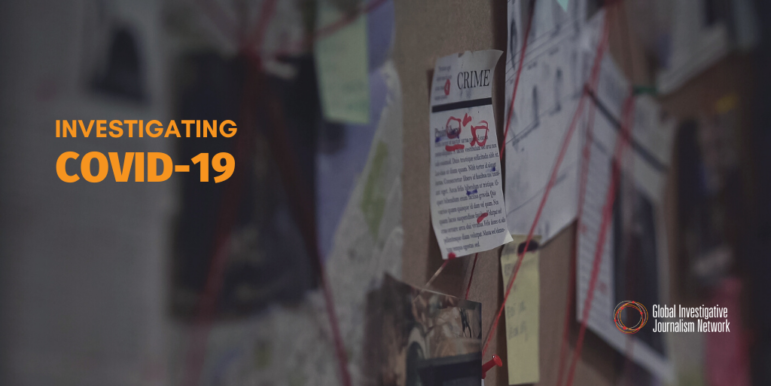

COVID-19: Expert Advice on Investigative Angles
Read this article in
বাংলা | 中文 | Français | Русский
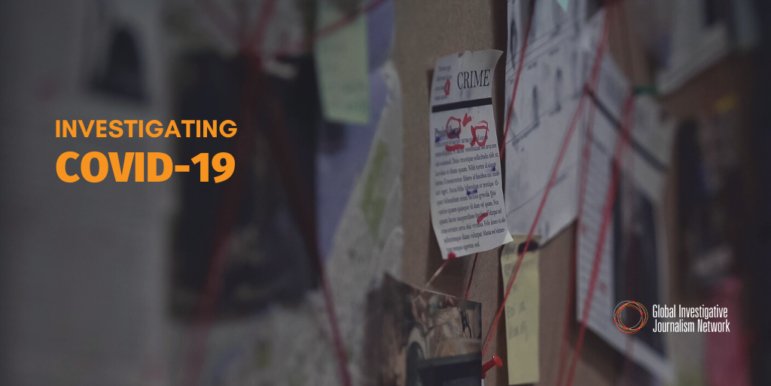 With the extraordinary measures being taken to counter the coronavirus outbreak, the work of investigative journalists scrutinizing abuses of power and exploitation of the vulnerable has never been more vital. Amid the fast-unfolding crisis, where should investigative reporters begin? And what tools and techniques will be essential to COVID-19 investigations?
With the extraordinary measures being taken to counter the coronavirus outbreak, the work of investigative journalists scrutinizing abuses of power and exploitation of the vulnerable has never been more vital. Amid the fast-unfolding crisis, where should investigative reporters begin? And what tools and techniques will be essential to COVID-19 investigations?
GIJN asked leading journalists in our global community — including experts in investigating disinformation, supply chains, and open source tools — for their advice to fellow reporters on what we should be scrutinizing during the outbreak. Here’s what they told us:
Miranda Patrucic
Deputy Editor-in-Chief, Regional Stories and Central Asia, Organized Crime and Corruption Reporting Project
 An expert on money laundering and criminal enterprises, Sarajevo-based Patrucic is a recipient of the Knight International Journalism Award, Global Shining Light Award, IRE Award, and European Press Prize.
An expert on money laundering and criminal enterprises, Sarajevo-based Patrucic is a recipient of the Knight International Journalism Award, Global Shining Light Award, IRE Award, and European Press Prize.
With states of emergency declared all over the world and governments struggling to deal with the pandemic, new opportunities for profiteering will arise. Hundreds of millions of dollars in urgent procurement and nontransparent spending to deal with the pandemic are planned. But the crisis also gives new avenues to hold those in power to account. Reporters should be looking into government spending, identifying new suppliers, their sourcing, and their prices. We should be looking for red flags — companies that have never traded in medical supplies, companies owned through offshore structures, preferred bidders with connections to elites, companies with meager turnovers in previous years, and so on. While it might be difficult to get information from governments, talking to competitors and those left out can help focus our investigations. But our work will not stop when the crisis is over. Only next year when accounts are filed we will understand the full scale of profiteering.
Malachy Browne
Senior Producer, Visual Investigations at The New York Times
 Browne and his team are pioneering a blend of traditional reporting with advanced digital forensics, such as collecting and parsing information from videos, photos and audio, analysis of satellite imagery, and 3-D reconstructions of crime scenes.
Browne and his team are pioneering a blend of traditional reporting with advanced digital forensics, such as collecting and parsing information from videos, photos and audio, analysis of satellite imagery, and 3-D reconstructions of crime scenes.
The effects of the coronavirus outbreak are being felt the world over, and in the absence of physical social contact, people are connecting through technology and social media platforms. And so we’re seeing the disruption to daily life very visibly, as it’s captured by the general population: chaotic scenes when borders are closed, the stillness of vibrant cities now missing their people, health professionals who’ve shown us the challenging conditions inside hospitals and hospices and the DIY protective gear they’re making, moments of solidarity as citizens applaud front line workers from their balconies and homes. And in the early days of the outbreak, social media and other online platforms enabled Chinese citizens to preserve and share information about the outbreak that was being censored by the government.
Satellite imagery and other data can allow us to visualize and monitor the effects of coronavirus. Visualizations of anonymized cell phone data have shown places where physical distancing has been more successful. Plane trackers and passenger data can also show us reductions in people’s movement over greater distances. Scientific organizations have measured and visualized reductions in pollution. Satellite imagery and ship tracking tools allowed us to show how much of North Korea’s fleet — once active around China — had anchored back at home, and the effect that may have on the economy. These and many other indicators and data have the ability to illustrate what’s happening now, and to more deeply analyze the effectiveness of various policies to contain COVID-19’s spread. And perhaps, in time, to assess the levels of disruption that may be tolerable to tackle issues like the climate crisis. Who knows what innovations will emerge from this crisis.
Eliot Higgins
Executive Director, Bellingcat
 Higgins has led Bellingcat to become one of the world’s foremost centers for open-source investigation. With contributors in 20 countries, his team has exposed Mexican drug lords, Syrian war crimes, and Russia’s shoot-down of flight MH17.
Higgins has led Bellingcat to become one of the world’s foremost centers for open-source investigation. With contributors in 20 countries, his team has exposed Mexican drug lords, Syrian war crimes, and Russia’s shoot-down of flight MH17.
One thing I’ve observed is how people are becoming more interested in fact-checking around coronavirus stories because of the amount of claims they’re seeing coming from all kinds of sources, including the media, government officials, and their own friends and families. Providing examples of thorough fact-checking and verification is great, but you can also engage audiences by taking them through the process step-by-step. A recent Twitter thread I posted as I went through verifying some photographs proved to be very popular, and let me demonstrate a variety of tools and techniques to a new audience, some of whom got involved with verifying the images as we were doing it. With so many of us stuck at home this is a good opportunity to get people involved with those sorts of online live demonstrations of our investigations, and it doesn’t have to be on the biggest and most significant claims. Just bring people along with you on your investigative journey.
Peter Klein
Founder and Executive Director, Global Reporting Center
 Klein founded the nonprofit Global Reporting Centre at the University of British Columbia to innovate how global journalism is practiced. He is leading an investigation of medical supply chains and the pandemic, in partnership with PBS Frontline and the Associated Press.
Klein founded the nonprofit Global Reporting Centre at the University of British Columbia to innovate how global journalism is practiced. He is leading an investigation of medical supply chains and the pandemic, in partnership with PBS Frontline and the Associated Press.
Journalism around the world is being deemed an “essential service,” along with healthcare workers, government officials, food suppliers and others who are needed to keep our societies functioning. We need to take this role seriously and step up to the plate. This is our opportunity to push back against the “fake news” mob that has been undermining our credibility. Never has fact-based journalism been more important, so get the facts right, and carefully think through the messaging you are giving to the public.
One of the big issues to emerge from the pandemic is the clear fact that our medical supply chain was not prepared for this crisis. Why were we not prepared, when so many public health experts have warned for years that a global pandemic was coming and would overwhelm the system? Who is profiting off medical supply commerce and what is their role in either helping or hindering the distribution of needed medical supplies? What’s the role of intellectual property in an increasingly-IP-focused industry? What’s the nature of medical supply chains that makes it so unresponsive to sudden changes in demand?
Criminals look for vulnerabilities in systems, and this crisis has certainly highlighted that we are vulnerable. The need for life-saving equipment can exacerbate existing government and corporate corruption. My advice to journalists around the world is to follow their past reporting, and look under those old rocks. If there were corrupt officials or businesses involved in scandals in the past, what’s their role now? A crisis like COVID-19 can also elevate existing inequities. The loudest and richest countries tend to get the attention — and the equipment. How are less powerful and resourced countries coping with this crisis, and what are world leaders doing to address those inequities. However, countries where our world’s medical equipment is manufactured may have an advantage as well, potentially hoarding equipment meant for export, to be used domestically during this crisis. There are implications here as well, which are rich for investigation.
Jinkyung Byun
Lead Investigative Reporter, SisaIN (South Korea)
 Byun works with SisaIN, a leading Korean newsweekly. She has been on the front lines in covering her country’s coronavirus crisis.
Byun works with SisaIN, a leading Korean newsweekly. She has been on the front lines in covering her country’s coronavirus crisis.
How and why COVID-19 spread are indeed important questions, but COVID-19 spreads too fast for journalists to stay on the “how and why.” Investigative journalists should focus on forward-looking questions rather than analyzing the cause. Of course, investigative journalists are neither futurologists nor fortune tellers, but we should still strive to look ahead and make forecasts.
The best reference to turn to when looking ahead into the future is the challenges other countries have faced in the spread of the virus. For us, China was the only country that had as big a spread as South Korea had. But many measures China used — such as city lockdowns, a crackdown on press freedom, and restrictions on mobility rights — were not options for South Korea as a democratic country. It was also difficult to trust that information on COVID-19 [in China] was transparent and free. Still, we could find information about the challenges China had faced in between the success stories featured [by state-controlled media]. I thought South Korea could be facing the same challenges and wrote stories on how to prepare for such difficulties. By covering this pandemic, I have come to realize that the lives of people are not that different from country to country, and the problems we face are quite similar.
Investigative coverage should include comparative analyses on each country’s measures on COVID-19. However, it won’t be easy to do. The political, cultural, and economic situation each country is facing is different, thus the same strategy could bring very different results. While journalists from a certain country may already know about such context, journalists from other countries may not understand it and could make judgments based on reports that merely scratch the surface.
Investigative journalists have a real opportunity for international collaboration. SisaIN, the news magazine I work for, is a small organization and we have been mostly focusing on covering domestic issues. But during the current pandemic, we scrambled our existing network of overseas correspondents — as well as contacts from journalism conferences and overseas coverage — to look for stories and ask for contributions. We also combed through international medical journals and sent questions to public health experts. Facing a pandemic such as COVID-19, journalists should be looking into how much international collaboration is needed among governments, medical experts, and the media: what type of collaboration is needed, specific means of collaboration as well as best practices. Investigative journalists with international networks can play that role.
Fabiola Torres
Founder, Salud con Lupa
 Torres is director and founder of Lima-based Salud con Lupa (Health with a Magnifying Glass), a digital platform for collaborative journalism on public health in Latin America. She is also founder of the acclaimed investigative site Ojo Público.
Torres is director and founder of Lima-based Salud con Lupa (Health with a Magnifying Glass), a digital platform for collaborative journalism on public health in Latin America. She is also founder of the acclaimed investigative site Ojo Público.
In an attempt to handle the pandemic, the majority of countries in Latin America have declared a state of emergency. These measures include new rules for disposing of public money (which bypass the normal review process), border closures, and various civil rights and transportation restrictions designed to keep the population in mandatory confinement. This is a complex, challenging time for investigative journalism. I believe that now, more than ever, we can show the world that public health should be taken seriously. Public health is part of the agenda of many different sectors of society and is very much connected to the economy as well as local and international politics. Public health needs to be a permanent topic of discussion; if we only think about health when we get sick or there is a pandemic, then it is too late.
First, when doing daily coverage, we must always be asking ourselves: What is the most important thing to explain to my audience right now? We must keep in mind that journalism is a public service, especially for the people who are the most vulnerable and those suffering from political or corporate abuse. Second, we must ask ourselves: What is at stake in this pandemic? Who is benefiting from this global crisis? Pharmaceutical corporations, biotech companies, and companies making other healthcare equipment need more scrutiny than they usually receive. Many times, the rules governing trade and intellectual property rights have gone against the best interests of public health and human rights. Investigative journalists also need to look at the side effects of this pandemic. This virus has forced the world to come to a complete halt. These circumstances are creating even more poverty and inequality than existed before, so it is crucial that we investigate the economic and social impacts of the pandemic.
This pandemic has shown us that we need better collaborative, investigative journalism, on many topics. At Salud Con Lupa, we are working with other journalists all over Latin America to make information more transparent and share only verified information, as well as working on investigative reporting projects to help in the fight against abuses of power.
Martha Mendoza
National Writer, The Associated Press
 Silicon Valley-based Mendoza is a two-time Pulitzer Prize winner, for stories that helped free 2,000 men enslaved in the Thai seafood industry and that exposed the Korean War massacre at No Gun Ri.
Silicon Valley-based Mendoza is a two-time Pulitzer Prize winner, for stories that helped free 2,000 men enslaved in the Thai seafood industry and that exposed the Korean War massacre at No Gun Ri.
My general advice to reporters is if you can, team up. Having close colleagues to work together with during this intensive time both elevates your work and can bring humor and warmth into your daily interactions.
Giving voice to the voiceless is even more critical. Homeless, incarcerated and marginalized immigrant populations need to be reached. In terms of tools, I’ve been using ImportGenius, Panjiva, USASpending, trac.syr.edu, MarineTraffic, PACER and others.
When it comes to scrutinizing supply chains, use data and ignore the hyperbole. Let anecdotes be just that, anecdotes, but don’t draw conclusions from anything other than the actual numbers. Also this is a global story, so certainly localize, but keep that bigger context. And as always my friends, let’s file FOIAs.
Natalia Antelava
Editor-in-Chief, Coda Story
 Former BBC correspondent Antelava is founder of Coda Story, an innovative nonprofit that does deep-dives into subjects as diverse as the war on science, disinformation, the LGBTQ crisis, and migration.
Former BBC correspondent Antelava is founder of Coda Story, an innovative nonprofit that does deep-dives into subjects as diverse as the war on science, disinformation, the LGBTQ crisis, and migration.
My advice to journalists investigating the coronavirus is to treat it like any other investigation. Follow the money and tell the human story. Disinformation matters because it’s changing our societies. Like any other crisis it has victims and perpetrators. Our job is to find them. What needs more scrutiny? What quarantine is doing to our mental health and what COVID-19 is doing to the issue of privacy.
Ying Chan
Honorary Professor, University of Hong Kong
 Journalist and educator Ying Chan is founding director of the Journalism and Media Studies Centre at The University of Hong Kong. She has led acclaimed investigations into endangered species, human trafficking, and organized crime.
Journalist and educator Ying Chan is founding director of the Journalism and Media Studies Centre at The University of Hong Kong. She has led acclaimed investigations into endangered species, human trafficking, and organized crime.
To start with, reporters need to follow the old adage of “follow the money.” Take a deep dive and investigate the role of corporate and special interests behind the life and death issues of the pandemic. For example, what are the corporate interests behind the lack of tests and medical supplies? There are many tests on the market, in the US and globally. What private companies and manufacturers are making the tests? What are the obstacles in scaling up the tests? There’s also the issue of masks. We need a more complete mapping of the global supply chain, the role of private interests, the brokers and the corporations. Reuters had an excellent report and The New York Times reported on supplies in China. But this is only part of the story.
On protective gear, US media reported on the first airlift of supplies from China in late March. At a briefing later, a US official said the supplies have been sent to the private market, and admitted that “there has been abnormal behavior.” What are such behaviors? Reporters have been responding to the day-to-day developments. We need to do better in connecting the dots and probe the obvious failure of the system.
Susan Comrie
Investigative Journalist, AmaBhungane (South Africa)
 Comrie works at South Africa’s nonprofit investigative newsroom amaBhungane. She was at the heart of the group’s GuptaLeaks project, exposing South Africa’s biggest corruption scandal in years, and was named African Financial Journalist of the Year by Sanlam.
Comrie works at South Africa’s nonprofit investigative newsroom amaBhungane. She was at the heart of the group’s GuptaLeaks project, exposing South Africa’s biggest corruption scandal in years, and was named African Financial Journalist of the Year by Sanlam.
Emergency procurement presents massive opportunities for corruption, profiteering, and abuse. So I would keep an eye on any emergency contracts or contract extensions during this period. In South Africa, the Office of the Chief Procurement Officer publishes all contract expansions and deviations every quarter (available here), but there’s a long lag in getting this data so for more immediate results you’re going to have to rely on tip-offs from insiders.
Something unexpected to watch for is environmental regulations being sidelined because of COVID-19. Law firm Webber Wentzel put out a memo two weeks ago highlighting how parts of the National Environmental Management Act (NEMA) change during an “emergency situation,” which we are now deemed to be in. So in terms of environmental concerns, I would watch out for what is approved in the name of COVID-19 but also what else is happening while enforcement is preoccupied with the pandemic.
Syed Nazakat
Founder and Editor-in-Chief, DataLEADS (India)
 Nazakat runs data journalism initiative DataLEADS, which conducts training and runs India’s first data-driven website dedicated to healthcare reporting. As a correspondent at The Week, he won India’s prestigious Ramnath Goenka Excellence in Journalism Award.
Nazakat runs data journalism initiative DataLEADS, which conducts training and runs India’s first data-driven website dedicated to healthcare reporting. As a correspondent at The Week, he won India’s prestigious Ramnath Goenka Excellence in Journalism Award.
Journalists are under tremendous pressure as the daily news is pouring in relentlessly. But the key for investigative journalists is to hold their nerve. Don’t get distracted by daily events and press conferences. Investigate and dig deeper.
There are a lot of data available now. What is that data telling us about the unfolding crisis? What are public records, documents, government purchase orders, and medical supplies’ audit reports telling us? Are there cases of official negligence and inaction? Asking questions and finding people who can answer them is where investigative journalism starts. When it comes to tools, I think the key here is to fact-check everything you receive by using different online verification tools such as InVID, YouTube DataViewer, Yandex, CrowdTangle, reverse image searches and language audio verification tools to identify misleading and viral content online. Always remember that without facts, we don’t have truth.
One of the stories which journalists need to pay more attention is global wildlife trade, given that COVID-19 was caused by it, and many other zoonotic diseases were caused by wildlife. Over the years the volume of the live wild animal trade, even legally, has increased and we have no clear picture about its magnitude and its impact on human health.
Musikilu Mojeed
Editor-in-Chief, Nigeria’s Premium Times
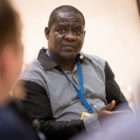 One of Nigeria’s leading investigative journalists, Mojeed has reported on corruption, human rights and human trafficking. Among his honors are the Global Shining Light Award, Wole Soyinka Investigative Reporting Awards, and a Data Journalism Award.
One of Nigeria’s leading investigative journalists, Mojeed has reported on corruption, human rights and human trafficking. Among his honors are the Global Shining Light Award, Wole Soyinka Investigative Reporting Awards, and a Data Journalism Award.
I believe this is the time for reporters to follow the billions being forked out in their various countries to fight the pandemic. In Nigeria, for instance, a private sector coalition has donated about 15 billion Nigerian Naira (around $39 million) to the federal government to support the administration’s effort to build well-equipped isolation centers and procure the necessary kits and medications to fight the disease. A lot of monies are being raised and spent, and it is possible that some officials might plot to illegally enrich themselves.
I believe the situations are similar in most of our countries. Reporters must continue to track expenditures and procurement procedures by officials. There is always a tendency for officials to mismanage or outright steal public funds in times of emergency such as this. Some countries are also pouring funds into research and clinical trials. It would be great to track expenditures on this with a view to determining what value for money the world is deriving from such expenditures. Reporters must determine that the pandemic did not end up enriching lazy professors who got research funding but delivered nothing.
Reporters must also pay attention to human rights abuses going on at this time around the world. There are lockdowns in many countries and authorities have called in the police, the military, and other security agencies to enforce the stay-at-home policies. There are reports security agencies in some countries are becoming increasingly overzealous, and are abusing citizens’ rights. Reporters have a responsibility to document these abuses.
Rawan Damen
Director General, Arab Reporters for Investigative Journalism
 Amman-based Damen leads ARIJ, the Middle East’s premier nonprofit center for investigative reporting. She has spent two decades as a filmmaker, producing and directing over 30 hours of documentaries for Al Jazeera Media Network and others.
Amman-based Damen leads ARIJ, the Middle East’s premier nonprofit center for investigative reporting. She has spent two decades as a filmmaker, producing and directing over 30 hours of documentaries for Al Jazeera Media Network and others.
This is the biggest story in 2020 and probably will be for many years to come. This is not only a health or science story; this is a socio-political-economic story, this is a human rights, race, and cultural story. My first piece of advice is to make sure you are there to cover the story and do not “become the story” by risking your health. There is a major need for clarity of information, as stories about COVID-19 are and will be consumed widely. There is also an excellent opportunity for cross-border collaboration as journalists are all covering the same story, and the vast majority cannot leave their countries. At the same time, it’s important to ask yourself what makes your story unique. It is also a very dynamic, fast-changing situation, so we may need both quick turnaround investigations with a short production cycle, as much as we need the traditional long-term investigations with a long shelf life.
For those doing investigations from home, with no access to the field, do not tell us what experts know, tell us how experts know it. Cover not only the model but the motivation behind the model; not only the numbers, but their context. Carefully analyze what health officials and politicians say and hold them accountable. It is important to adapt to using the phone and digital tools like Signal, Jitsi or Zoom to talk to your sources. This is the time to build relationships with new sources and diversify your sources as much as you can. Lastly, take good care not to stigmatize those infected or be racist in your reporting.





